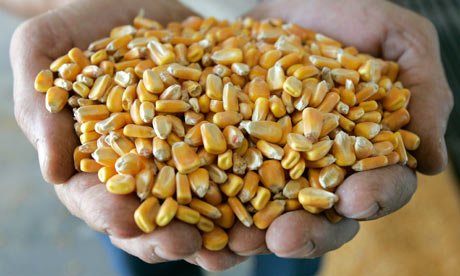Demand for biofuels in the US is driving this year's high food prices, a report has said. It predicts that food prices are unlikely to fall back down for another two years.
The report, produced by Purdue University economists for the Farm Foundation policy organisation, said US government support for ethanol, including subsidies, had fuelled strong demand for corn over the last five years.
A dramatic rise in Chinese imports of soybeans was also putting pressure on prices and supply, the report said.
Since 2005, a growing number of US farmers have switched to corn and soybeans from other crops. Farmers in other countries have also switched to corn but, the report said, the demand kept growing.
"In 2005, we were using about 16m acres [6.4m hectares] to supply all of the ethanol in the United States and Chinese soybean imports," Wallace Tyner, one of the authors said. It took 18.6m hectares (46.5m acres) last year, just to satisfy that demand.
The US department of agriculture reported earlier this month that US ethanol refiners were for the first time consuming more corn than livestock and poultry farmers.
It took 27% of last year's corn crop to meet the demand for corn ethanol. Only about 10% went to make ethanol in 2005, Tyner said.
The Centre for Agricultural and Rural Development at Iowa State University has estimated that 40% of the US corn crop now goes to make ethanol. But Tyner said the cobs and husks of corn used to make ethanol would go on to be used for animal feed.
The other driver of rising food prices was China, which has been building up its soybean reserves since the last big global food price rises of 2008.
But the report focused strongly on a US government mandate for ethanol production and $6bn (£3.7bn) in annual subsidies for ethanol refineries. Others have also been putting the corn ethanol industry in the spotlight.
In an interview with the Financial Times, General Mills, which produces Cheerios cereal, Häagen-Dazs ice-cream and other major brands, also blamed ethanol subsidies for driving up food prices. Ken Powell the company's chief executive said the price of corn and oats was up by 30 to 40% over last year.
"We're driving up food prices unnecessarily," Ken Powell, chief executive of General Mills, said in the interview. "If corn prices go up, wheat goes up. It's all linked."
Even if US ethanol production plateaus, as the report predicts, food prices are unlikely to recede – at least within the next year – because global soybean and corn crops are now in relatively tight supply.
The authors warned there just was not enough cropland available to shift to corn and soybeans.
"We don't think these prices are going to come down in a year," said Tyner. "It's going to take at least a couple of years to see a significant reduction in price."
The report warned that US corn and soybean stocks were also dangerously low, with the department of agriculture projecting supplies at about half typical levels.
"These are scary, scary numbers," said Christopher Hurt, another author. "The cupboard is absolutely bare. We just are going to get out of this, at least on the basis of crops for this year."









